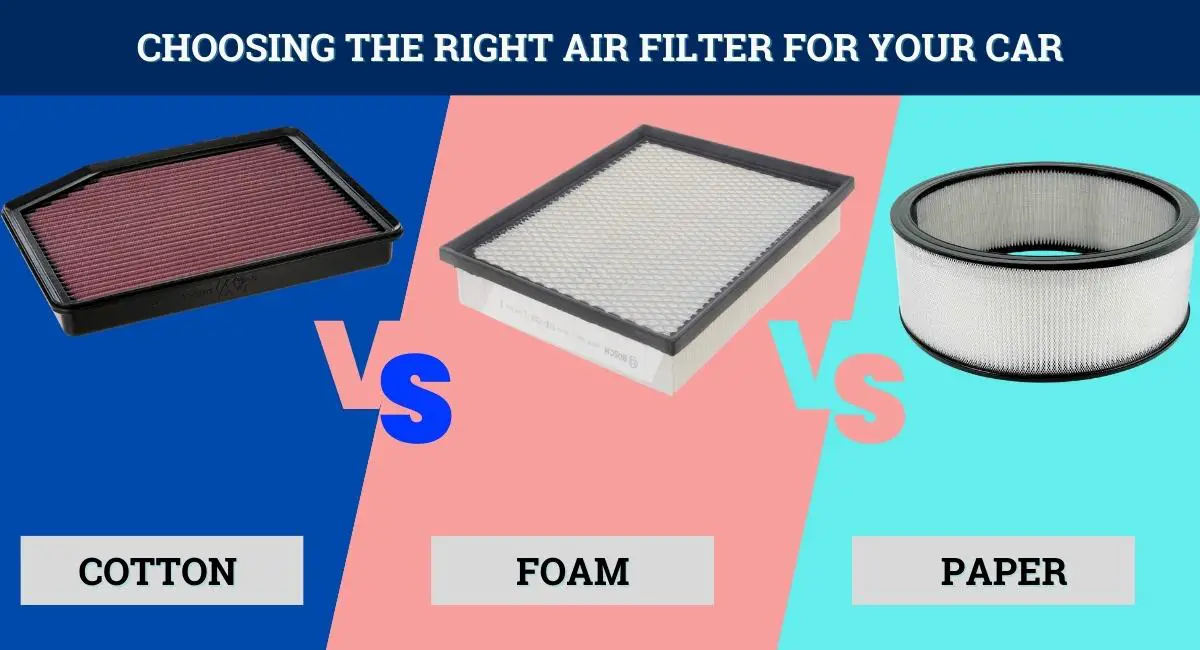When your engine performance starts to impair, fuel efficiency decreases, and you begin experiencing engine failures, chances are you have the wrong air filter for your car.
Air filters come in different forms, including paper, foam, and cotton. Paper is less costly and more accessible to clean and reuse. Foam is best for small engines, lasts longer than paper, and you can reuse them sometimes. Cotton has effective filtration, is best for aftermarket air filters, and allows the most airflow.
As you gamble on what material is the best for your car’s air filter, read this article to get the best guidance. Understanding their compositions, filtration efficiencies, and associated costs makes it easy to make an informed decision tailored to your car’s needs.

Types of Air Filters
Now, let’s break down these air filters to help you settle for the best material for your car.
Paper Air Filters
Paper air filters have long been the standard choice for many vehicles due to their affordability and widespread availability. Since they have a pleated paper element, these filters efficiently capture contaminants in the air, preventing them from entering the engine.
What Goes into the Making of Paper Air Filters?
Given their accessibility, what do you think goes into making paper air filters? Woven wood pulp fibers are the most cost-effective but least durable filter media material in making paper air filters. The construction involves compacting these fibers, forming a porous structure that enables air to pass through its delicate pores.
The paper filters are pleated to enhance mechanical strength and filtration efficiency. The pleats increase the surface area for particle capture and reinforce the overall structure, ensuring effective separation of small particles as air passes through the filter. This pleating process is a vital aspect of the construction, contributing to the filter’s performance in trapping contaminants.
With that said, it is time to focus on why you might settle for paper air filters for your car engine. The following sections give more explanations.
Filtration Efficiency
A suitable air filter must be effective at filtration. So, you’ll never go wrong with paper air filters. They excel at trapping small particles, providing an effective barrier against dirt and debris. Research indicates that paper filters can achieve a filtration efficiency of 95% or higher for particles as small as 0.3 microns, protecting your engine from harmful pollutants.
Cost Consideration
Paper air filters are typically the most budget-friendly option among air filter types. Who wouldn’t want to save some cash? Their low initial cost is a great advantage. Plus, paper air filters are easy to find and commonly stocked at automotive retailers, making replacements convenient. However, they are typically disposable, necessitating regular replacements. The cost-effectiveness diminishes over time as frequent replacements add up.
Pros and Cons
As I mentioned, paper air filters are a cost-effective choice, readily available and boasting high filtration efficiency, effectively protecting the engine.
However, their disposable nature necessitates frequent replacements, potentially increasing long-term costs and contributing to environmental waste. While suitable for regular driving conditions, they may not withstand extreme environments as effectively as other filter types, such as foam or cotton.
Foam Air Filters
Foam air filters, constructed from porous polyurethane foam, provide a reusable and washable alternative to paper filters. These filters are popular in off-road and high-dust environments due to their durability and the ability to withstand challenging conditions.
Foam air filters are made by mixing liquid polyurethane with a foaming agent, pouring it into molds, allowing it to cure, and then cutting and shaping the foam to fit the desired dimensions. The process controls pore size and density, which is crucial for filtration efficiency.
Besides, foam filters are known for durability, flexibility, and effectively capturing larger particles. Their resilience makes them suitable for off-road environments, and their reusable nature adds to their appeal for sustainability and cost-effectiveness.
Filtration Efficiency
Foam filters effectively trap larger particles but may have slightly lower filtration efficiency for smaller particles than paper filters. They balance filtration and airflow, making them suitable for specific driving conditions.
Durability and Maintenance
The reusable nature of foam filters stands out as a significant advantage. Regular cleaning and re-oiling extend their lifespan, making them a cost-effective choice in the long run. Foam filters are exceptionally resilient in dusty environments, requiring less frequent replacements than paper filters.
Pros and Cons
Foam filters offer reusability, durability, and better performance in off-road conditions. However, they may have a slightly lower filtration efficiency for smaller particles, and their initial cost is higher than disposable paper filters.
Cotton Air Filters
Cotton air filters are performance filters on the market featuring gauze or fabric layers. These filters have a design that provides improved airflow while maintaining effective particle filtration.
Filtration Efficiency
Cotton filters strike a balance between filtration efficiency and airflow. They typically have a filtration efficiency similar to paper filters for small particles, offering better airflow and enhancing engine performance.
Reusability and Maintenance
Cotton filters are often reusable; you can clean and re-oil them, extending their lifespan. While they require periodic maintenance, the initial investment pays off over time with fewer replacements.
Pros and Cons
Cotton filters offer enhanced airflow, reusable design, and cost savings. However, their initial cost is higher than disposable paper filters, and they may not be as effective in extreme dust conditions as foam filters.
What are the Factors to Consider When Choosing an Air Filter
Vehicle Specifications
Compatibility with your vehicle’s make and model is crucial when selecting an air filter. Consult your car’s manual or an automotive expert to ensure the chosen filter meets the manufacturer’s recommendations. Additionally, consider the specific requirements of your engine, as different engines may have varying needs regarding airflow and filtration.
Driving Conditions
Your driving environment significantly influences the choice of air filter. If you primarily drive in dusty or off-road conditions, a filter with high dust retention capabilities, such as foam or cotton, may be more suitable. On the other hand, if your driving is primarily urban or on paved roads, a standard paper filter may suffice.
Maintenance
Evaluate your willingness and ability to perform regular maintenance on the air filter. Disposable paper filters require straightforward replacements, while reusable foam and cotton filters demand periodic cleaning and re-oiling. When deciding on the maintenance routine that best suits your lifestyle, consider your time, budget, and preferences.
Performance Comparison
The comparison table below gives a general overview of the features of paper, foam, and cotton air filters. Actual performance might vary based on specific product specifications and manufacturers.
| Features | Paper Air Filters | Foam Air Filters | Cotton Air Filters |
|---|---|---|---|
| Material | Woven wood pulp fibers | Polyurethane foam | Cotton fabric layers |
| Filtration Efficiency | High for small particles | Effective for larger particles | Balanced for small and large particles |
| Durability | Least durable. | Durable, especially in off-road conditions | Durable, with periodic cleaning and re-oiling |
| Maintenance | Disposable, regular replacement | Reusable requires regular cleaning | Reusable, requires cleaning and re-oiling |
| Air Flow Restriction | It may have higher restrictions. | Balanced compromise between filtration and airflow | Enhanced airflow with effective filtration |
| Cost | Inexpensive upfront cost. | Moderate upfront cost | Higher upfront cost, cost-effective over time |
| Environmental Impact | Contributes to waste | Reduced waste, reusable | Reusable, environmentally friendly |
| Performance in Extreme Conditions | It may be less effective | Well-suited for off-road conditions | Effective with proper maintenance |
While the above table compares the features, I have another breakdown below that compares filtration and airflow efficiency.
Filtration Efficiency of Foam vs Paper Air Filters
Foam air filters are generally effective at capturing larger particles, making them suitable for off-road conditions. However, paper air filters often exhibit higher filtration efficiency when it comes to small particles. Paper filters can achieve 95% or more efficiencies for particles as small as 0.3 microns, providing reliable protection against fine contaminants.
Airflow of Cotton vs Paper and Foam Air Filters
Cotton air filters have a design that balances filtration efficiency and airflow. While paper filters may have slightly higher airflow restrictions due to their dense structure, foam filters also balance filtration and airflow. Cotton filters, however, are known for enhancing airflow without compromising filtration efficiency, making them suitable for improved engine performance.
Other Types of Air Filters
While I have been reviewing only the three types of air filter materials, remember there are other options. So, besides paper, foam, and cotton air filters, there are other specialized air filters used in cars, such as:
Synthetic Air Filters: These filters balance performance and cost, often with a longer lifespan than traditional paper filters, and result from synthetic materials.
Oil-Bath Air Filters: These filters use an oil bath to trap contaminants. While they are not as common in modern vehicles, they were historically used in some older cars and specific applications.
Carbon Air Filters: These filters incorporate activated carbon to adsorb odors, gaseous pollutants, and trapping particles. They are common in cabin air filtration systems.
K&N Style Filters: These are oiled cotton filters designed for high-performance applications. They are washable and reusable, providing improved airflow and filtration efficiency.
The air filter choice depends on driving conditions, maintenance preferences, and specific vehicle requirements. It’s essential to consult the vehicle’s manual and consider expert recommendations when choosing the most suitable air filter type for a particular car.
Environmental Impact
Today, climate change is a hot topic, and the sustainability of the environment is essential. It means that you must consider the environmental impact of an air filter. Therefore, below is advice on disposing, reusing, or recycling your used air filter.
Disposable Filters and Waste
The environmental impact of disposable paper filters is a notable concern. Frequent replacements contribute to increased waste, and the disposal of used filters may pose environmental challenges. When choosing disposable filters, consider local recycling options to minimize the ecological footprint.
Reusable Filters and Sustainability
Foam and cotton filters, with their reusable designs, contribute to sustainability by reducing the volume of discarded filters. Regular cleaning and re-oiling extend the lifespan of these filters, aligning with environmentally conscious practices. When selecting a filter, consider its long-term environmental impact and choose an alternative that aligns with your sustainability goals.
Recycling Options
Investigate recycling options for air filters in your region. Some manufacturers and auto parts stores offer recycling programs for used filters. By responsibly disposing of or recycling your old filters, you can minimize the environmental impact of your vehicle maintenance.
Conclusion
Choosing the right air filter for your car is a crucial decision that impacts engine performance, fuel efficiency, and overall vehicle longevity. Paper, foam, and cotton filters each have advantages and disadvantages, catering to different driving conditions and personal preferences. By considering factors such as filtration efficiency, airflow, cost, maintenance, and environmental impact, you can make an informed decision that aligns with your car’s needs. Consider your vehicle’s manual and seek expert advice to ensure the chosen air filter matches your car’s specifications. A well-informed choice will ultimately contribute to optimal engine health and a smoother driving experience.
